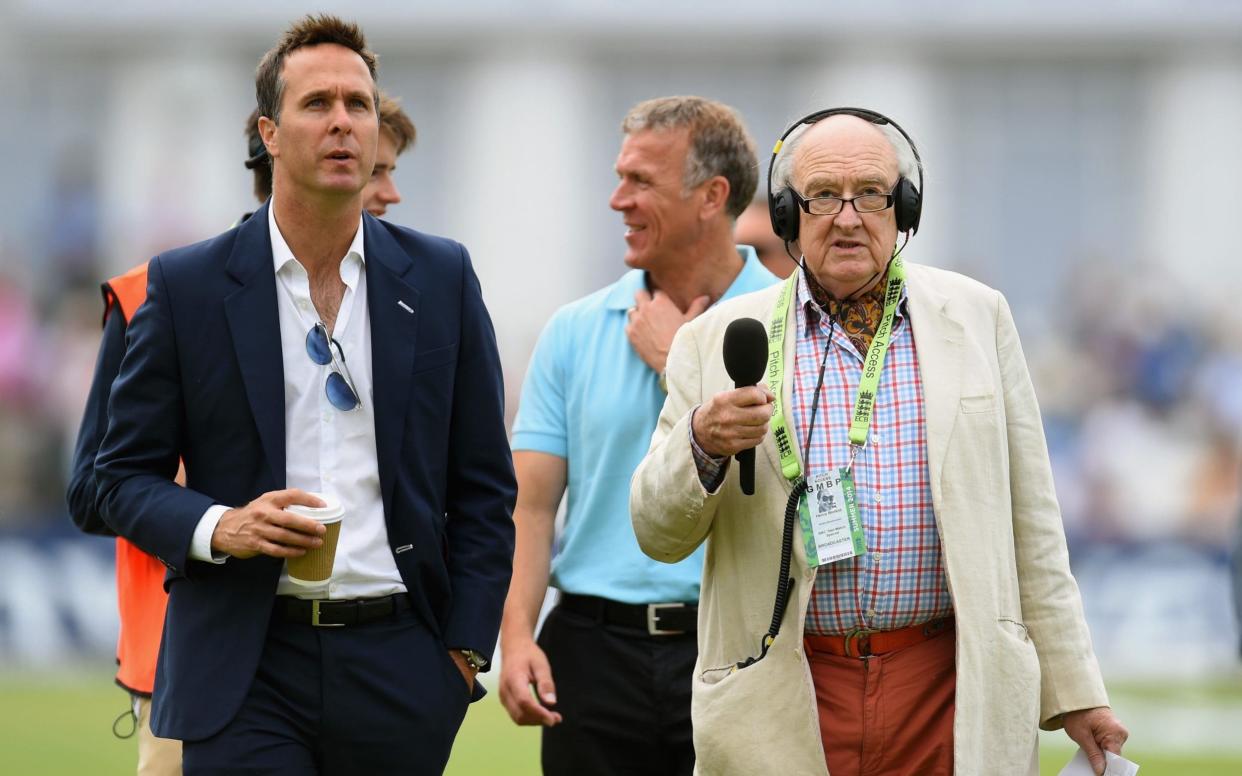Voice of cricket Henry Blofeld retires after finding himself 'out of kilter' with style of younger commentators

For decades he has been the voice of cricket, the man whose avuncular tones have heralded the arrival of the Test Match season for everyone who loves the sound of leather on willow.
But Henry Blofeld, the long serving commentator for BBC Radio 4’s Test Match Special, says his style of commentary - with his perambulations about pigeons, tea and passing buses - is now regarded as “out of kilter” with that of his younger colleagues.
Announcing his retirement yesterday, after nearly 50 years in the job, he told The Telegraph it was time for an “old fart” like him to hang up his microphone.
Blowers - as he is known to his fans - said: “I’m sure my style is a bit out of step now. Commentary evolves, like the rest of life. I think the new comers feel I’m a bit out of kilter with them. They do it their way and when I come and sit down I like to describe things. It’s different.”
In recent years Blofeld’s plummy tones have stood in contrast with the ‘bloke down the pub’ style of younger colleagues such as Michael Vaughan and Phil Tuffnell.
But in characteristically self-deprecating style he said: “It’s the age old thing of people my age saying ‘Things ain't what they used to be’ and when you start saying that it’s time to go. We’re all getting on.”

Fans complained that Blofeld’s appearances on Test Match Special became rarer after 2006 and yesterday he admitted he would have liked to have featured more frequently.
"From my own selfish point of view it would have been nicer not to have just done it occasionally, to have done it without the gaps,” he said. “To have a more consistent team working is an advantage because you get a rhythm for the summer and that's been broken to a certain extent with lots of new commentators. Because they've got a lot of new people to call on they have to use them."
In a moving statement issued on his own website Blofeld, now aged 77, said: “All good things come to an end. In all honesty, at the age of almost 78, although I am still rather keener than mustard, I find it harder work than I once did. The one thing I don't want to do more than anything, is for my incompetence to let TMS down.”
He added: “Listeners will now be relieved to know that their chances of being told the right name of the fielders at third man and fine leg have greatly increased.”
Blofeld also said he now looked forward to rejoining the ranks of ordinary cricket fans, able to enjoy the game for its own sake without fear of making a blooper on air.
“I shall be able to come to the cricket without worrying about who is lurking down at third man. I shall also be able to have a drink without feeling I am being politically incorrect. And hallelujah to that!” he said.
Blofeld will take the microphone for the final time when England host West Indies on 7 September, after commentating next month on England’s first two Tests against South Africa.

The world of cricket might easily have been without his voice, had he enjoyed his initial career choice of merchant banking more than he did.
But after what he described as three “unfullfilling” years in finance during the 1960s, he made the switch to sports journalism.
Blofeld had been a gifted wicket keeper at Eton and played first-class matches for Cambridge University, but had to give up the sport as a result of the injuries he suffered when his bike hit a bus.
He joined Test Match Special in 1972 and his regular use of the phrase "my dear old thing" became an integral part of summer for thousands of listeners.
Blofeld, who has been married three times, had a double heart bypass operation in 1999 after being diagnosed with angina and was given the last rites by his brother in law after he nearly died in intensive care following the operation.
In 2003 he was awarded an OBE for services to broadcasting.
The announcement of his imminent departure prompted colleagues and admirers to ask him to reconsider.
Vaughan, who captained England when they regained the Ashes in 2005, wrote on Twitter: “No [Blowers] please please change your mind. Many players have brought joy to thousands but I can't think of anyone who has bought more joy to the airwaves.”
Looking back over his career Blofeld picked out one outstanding highlight, shared by many cricket fans of a certain generation - England’s third Test win over Australia in 1981.
The series became known as 'Botham's Ashes', as a result of Ian Botham's incredible performance with both bat and ball.
"My greatest memory? Headingley 1981, that amazing Test against Australia,” said Blofeld. “Botham 149 not out, Willis eight for 43. Always good to beat Australia isn't it?"
Blowers' best moments:
“Flintoff now, great leap, he bowls, Gilchrist has edged it ... oh! He’s caught it; it’s an absolutely staggering catch by Strauss! He edged it, Strauss flung himself miles to his left and, one handed, somehow managed to hold on, it was an extraordinary effort,” – on Andrew Strauss’ extraordinary catch at second slip during the 2005 Ashes.
“Ashley Giles trundles in to bowl rather like a wheelie bin.”
“Here’s Willis, in, bowls to Bright, Bright’s bowled! The middle stump’s out of the ground; England have won. They’ve won by 18 runs. Willis runs around punching the air, the boys invade the ground, and the players run, helter-skelter, for the pavilion. Well, what a finish,” – on the moment Bob Willis secured England’s Ashes Test victory at Headingley in 1981.
“It ballooned into the air and Bell dived forward like a porpoise after a fish and came up with the winner,” – describing Ian Bell’s catch at short leg in the 2005 Ashes series.
“Well you might, you never know. After all Fred Trueman’s daughter married Raquel Welch’s son. So anything is possible isn’t it?” – responding to Geoffrey Boycott’s assertion that he is unlikely to meet the singer Katy Perry because she is American.
“Oh! Look! I’ve just seen a crane at Lord’s actually moving, doing some work. I’ve seen cranes all around this ground for years and they’ve always been still. That big white one there is moving. A moving crane, a yellow helicopter, what more has the day got to offer?” - on the Lord’s skyline

 Yahoo News
Yahoo News 
